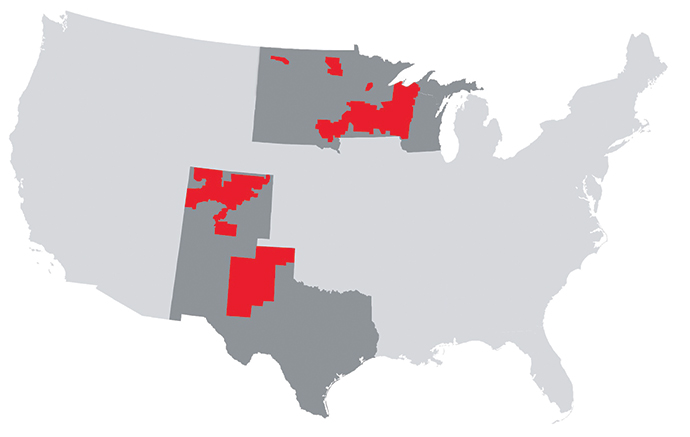With a 100-year track record, an inventory of 45 certified sites, a visionary focus on renewable energy deployment and a suite of economic development services as solid as its 99.9% electric service reliability, Xcel Energy lives up to its name when it comes to supporting company growth across the parts of eight states it serves.
In 2018, through its Partners in Energy program that supports communities in achieving clean energy, economic development and energy conservation goals, the Xcel Energy team generated and supported over 85 new business prospects. Nine of them invested in projects involving nearly 1,950 jobs and $750 million in capital investment. Among the top clusters Xcel Energy is focused on are:
- Aerospace and defense contractors
- Data centers
- Refrigerated storage warehouse and distribution
- Food and beverage processors
- Vertical farming
- Industrial manufacturing
- Medical device, instrument and supply manufacturing
- Oil and gas

Xcel Energy’s renewables goals and transition actions dovetail frequently with the goals of its customers in those sectors. Exhibit A: Xcel Energy plans to provide renewable energy to a proposed Google data center to be located on Xcel Energy property adjacent to its Sherco Generating Plant in Becker, Minnesota, where two of the plant’s oldest coal units will be retired. The state estimates the project will result in nearly 2,000 construction jobs, 50 full-time jobs and economic growth of almost $150 million.
Brett C. Carter, Xcel Energy’s executive vice president and chief customer and innovation officer, responded to three questions from Site Selection.
How have you seen economic development in the utility arena evolve over the course of your career, and how does it fit into Xcel Energy’s mission and strategy today?
Brett C. Carter: Utilities have really come from the background into the forefront in economic development. In many ways, active utilities give communities an edge, leveraging their powerful network to help increase project speed to market and offering beneficial pricing models to incentivize development, particularly for energy-intensive ventures.
Similarly, a key consideration for businesses today is not only cost per kWh, but where that energy is coming from. A 2019 study from Deloitte reported more than half of U.S. businesses increased their commitments to renewable energy recently and more than 86% surveyed said environmental efforts are a necessary step towards staying financially competitive. Utilities who can offer solutions in this space provide a huge incentive to businesses.

“When companies pay less for the energy that powers their business, they can invest more in the people they need to run their business.”
Xcel Energy has been a leader in energy efficiency for more than two decades. Our commitment to keeping our customers’ bills as low as possible means that in addition to providing low-cost power, we have a robust suite of energy efficiency programs and expertise to consult on project design, in addition to one of the largest incentive programs in the country.
Today, by setting the benchmark for corporate responsibility with our Carbon-Free by 2050 commitment, we are a critical partner in helping companies reach their sustainability goals.
What are the leading cost, workforce and infrastructure issues you hear about from customer executives, and how is the Xcel Energy team addressing them?
Brett C. Carter: Our costs are below the national average, and when combined with our energy efficiency incentives, rate incentives, renewable energy and real estate offerings, we have a strong value proposition in place for businesses looking to relocate or expand. Our “Steel for Fuel” investment strategy — the dramatic build out of our wind generation fleet — is not only a sustainability initiative. By investing in owned renewable generation, we are continually driving down costs of generation, which translates to lower bills for our customers.
Workforce concerns remain the number one issue we hear about. Like the rest of the country, unemployment is exceedingly low across our footprint, ranging from 2.8% to 3.4%. Again, because of our strategic investments and all the tools we can offer businesses to keep their energy costs down, we can help free up additional resources to allow companies the opportunity to invest in their workforce recruitment and retention efforts. When companies pay less for the energy that powers their business, they can invest more in the people they need to run their business.
I’d be remiss if I didn’t highlight the competitive edge the communities we serve offer themselves. One key benefit for businesses interested in investing in our territory is a product of the growth and development of our communities: We serve communities which are attractive to talent due to their culture, economies and lower costs of living.
Which technical tools have you helped bring to the fore to increase the effectiveness of Xcel Energy’s economic development offering?
Brett C. Carter: In addition to our Certified Site Program, our suite of energy efficiency incentives — more than 20 programs for the Commercial & Industrial sector alone — is one of the most robust offerings available to businesses.
We also provide programs to specifically support energy-intensive ventures such as data centers, a growth area for much of our territory. Our offerings include Data Center Design Assistance, which supports new data center development through free, comprehensive services to identify energy cost-saving strategies for construction or major renovation projects, as well as earn incentives based on the overall energy savings gained by incorporating high-efficiency equipment and systems. For existing data center developments, we created the Data Center Energy Efficiency program, which helps in identifying attractive incentives for implementing energy-saving, environmentally friendly data center practices.
Xcel Energy also gives our customers a Certified Renewable Percentage, a verified and accurate measurement of the amount of power usage coming from renewable sources.
Our third-party validation is particularly beneficial for those companies looking to authentically report on their sustainability goals. Currently, this service is only available in some of the states we serve, but efforts are underway to expand to all territories.
Finally, in the coming months and years, Xcel Energy investments will bring a host of new benefits to developers seeking to invest in our territory. This includes expansion of electric vehicle infrastructure and access to charging equipment to make fleet electrification a viable option for businesses.
It also includes the rollout of our advanced metering infrastructure, or AMI, which will not only support greater energy reliability and lower costs, but also power a range of new programs and services Xcel Energy can offer to businesses to manage and lower their energy costs.
This Investment Profile has been prepared under the auspices of Xcel Energy.
For more information, visit www.xcelenergy.com.

